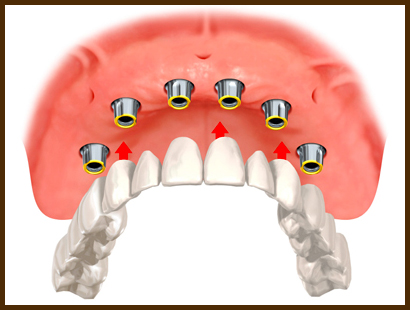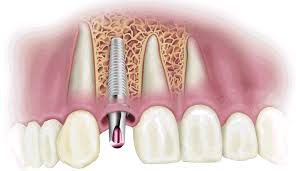Dental Implants
Replacing missing teeth is essential to your overall dental hygiene as a gap leaves the remaining teeth unsupported. These may drift along the jaw line, making brushing and flossing more difficult. Missing teeth can change the shape of your face and make you look older and less healthy. So, if you have missing teeth, it is advisable to have tooth replacement treatment as soon as possible.

What are dental implants?
A dental implant is essentially a substitute for a tooth's natural root and is commonly screw or cylinder shaped. Dental implants are usually made of titanium, a metal that is well-tolerated by the body. Over time, the jawbone becomes firmly united with the implant. A small attachment at the top of the dental implant emerges through the gum. Crowns, bridges or dentures can then be attached to the implant by screws or clips. In some cases (but not every) before implantation sinus lift and bone substitution need to be performed.

A dental implant is an artificial tooth root replacement and is used in prosthetic dentistry to support restorations that resemble a tooth or group of teeth.
Important: Implant means root replacement (located inside the jawbone) without any "teeth" (prosthetic devices i.e. crowns/bridge/denture) on top of them.

Why have implants?
- Implants are an alternative to conventional bridges and partial dentures.
- If you find that your full dentures move around a lot, implants will help to anchor the denture in place.
- When teeth are lost, the jawbone may start to shrink. Implants can help slow this process down.
- Your dentist may recommend using implants to support a bridge rather than cut into healthy teeth either side of a gap.
Replacing missing teeth is essential to your overall dental hygiene, as a gap leaves the remaining teeth unsupported. If left unsupported, the remaining teeth may drift along the jaw line, reducing the spaces between them; they may become weaker, making brushing and flossing more difficult. Missing teeth can jeopardize the integrity of the jaw line and change the shape of your face. Missing teeth can make you look older and less healthy.
What are the different types of implants?
There are several implantation systems that our doctors use:
Nobel Biocare Replace System (Swedish) (lifetime guarantee on material defects)
NobelReplace is the implant of choice for users of all levels.
NobelReplace is ideal for single-tooth restorations, fixed partial dentures as well as full arch fixed and removable solutions such as implant bridges. Furthermore, NobelReplace can be used for immediate extraction sites, if a specific case allows.
Who is suitable for dental implants?
While increasingly popular, implants are not appropriate for everyone. You need to be medically fit and have healthy gums and a sufficient thickness of jawbone. Your dentist will assess the amount of bone still there. If there is not enough, or if it isn’t healthy enough, it may not be possible to place implants without grafting bone into the area first.
If I do not have enough bone, what can be done?
Bone substitution is a term that is used to describe the procedure to "build" bone so that dental implants can be placed. These procedures typically involve grafting (adding) bone or bonelike materials to the jaw, and waiting for the grafted material to fuse with the existing bone over several months. After a bone-substitution procedure we usually wait 6 – 8 months before placing implants except for certain cases when bone substitution and implantation are possible at the same time.
What is a sinus lift?
In the upper jaw above the back teeth, it is possible to increase the height of bone available. This procedure is called ‘sinus augmentation or sinus lift’ and it involves lifting the sinus membrane and completing the gained space by bonelike material. Without this process many patients would be unable to have implants in a part of the mouth where teeth are so commonly missing.
How long does implantation take?
From the time of implant placement to the time of placing the first teeth, treatment times can vary between 2 weeks and 6 months. Your dentist will be able to give you a personalized timetable before the treatment begins.
Stage 1:
Implantation The procedure itself takes 10-15 minutes/implant. The dentist exposes the bone in the jaw where the tooth is missing, then he drills a hole and inserts the implant into the bone. This is usually done under local anesthesia but other means of sedation can be used at extra cost. The gum is then stitched and it is left to heal while the bone grows around the implant, making it secure. A temporary healing abutment is often placed on the implant to allow the gum tissues to heal. If the treatment is carried out in Budapest you can leave the day after the operation.Stage 2:
Stitches removal The stitches are removed approximately a week later.Stage 3:
Implant exposure After a 20-week healing period a small cut is made in the gum and a healing abutment is placed on top of the implant. The healing abutment is a screw that helps the gum form perfectly before placing the final solution.Stage 4:
Final fitting The dentist takes an impression and the laboratory starts preparing the final solution. Following several tries, provided the dentist and the patient are both satisfied the final solution will be fitted on the abutments. This stage requires a 5-10-work-day-visit in Budapest or several shorter visits in London. As technology evolves in more and more cases the final solution can be fitted on the implants immediately after implantation.Will I be toothless?
Between operations you will not be left toothless but will be fitted with temporary teeth.
What else can be placed on dental implants?
If you have no teeth in the lower jaw, and are not yet ready for multiple implant placements, a conventional lower denture can be considerably improved with two implants placed beneath the front section - this is called an ‘overdenture’ or retained denture. The same overdenture concept when used to treat the upper jaw, will usually require more implants as the bone is generally softer. Implant-supported overdentures, just like conventional dentures are still removed for daily cleaning, however, once back in the mouth, the implants make them much more stable.
What can I expect after implantation?
Following surgery, there will probably be bleeding, controlled by biting down on some gauze. Swelling may be controlled using an ice pack. Gums are generally sore after the surgery for 7 – 10 days. Antibiotics and painkillers will be provided. You will be able to drink but eating might be difficult for 24 hours after the implantation.
How do I care for my implants?
To help maintain your implants you need to thoroughly brush and floss regularly. Your dentist will give you specific advice on caring for your implants. He or she will ask you to attend regular check-ups.
What are the risks of implantation?
Implant surgery is a safe procedure; however, as all surgeries it carries an element of risk. Before deciding whether or not to have implants, you need to be aware of the possible side-effects and the risk of complications. Smoking, alcohol consumption, diabetes may effect tissue healing and may limit the success of the implant. Our dentists will advise you so you can make an informed decision.
Important: Smoking automatically means limited guarantee. Uncontrolled diabetes and neglected oral hygienie also leads to the forfeit of guarantee.
What are the possible side effects of implantation?
Examples of side-effects include feeling sick as a result of the anesthesia or sedation and some swelling and discomfort around the implant area.
What complications can occur?
The complications of any surgical procedure can include excessive bleeding, an unexpected reaction to the anesthetic or infection. If necessary you will be prescribed antibiotics and an antiseptic mouthwash to reduce the risk of your implant becoming infected. Your lower jaw contains nerves, which supply feeling to your tongue, chin, lower lip and lower teeth. In a small percentage of cases during implant surgery in the lower jaw the nerves may be bruised and may cause a tingling or numb feeling in your tongue, chin or lip. The chance of complications depends on the exact type of procedure you are having and other factors such as your general health.